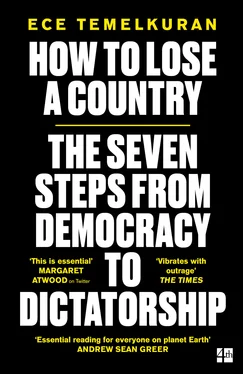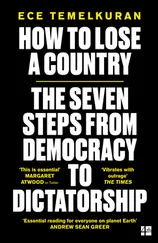And every time the masses adapt to the new narrative, regardless of the fact that it often contradicts how the movement began in the first place. In Turkey, the Gülen movement, a supranational religious network led by an imam who currently lives in Pennsylvania, was an integral part of Erdoğan’s movement, until it was labelled terrorist overnight. The same AKP ministers and party members who had knelt to kiss the imam Fethullah Gülen’s hand were, less than twenty-four hours later, falling over themselves to curse him, and none of Erdoğan’s supporters questioned this shift. Doubtless Trump voters did not find it odd when the FBI, Trump’s very best friend during the probing of Hillary Clinton’s emails scandal, all of a sudden became ‘disgraceful’ after it started questioning whether Trump’s election campaign had colluded with the Russian government. Instead, Fox News called the FBI a ‘criminal cabal’ and started talking about a possible coup, confident that Trump’s supporters would follow the new lead, feeling, as their leader did, victimised by the disrespectful establishment. Once the identification of the masses and the movement with the leader begins, the ever-changing nature of the content of the manufactured victimhood becomes insignificant. And when the leader is a master of ‘truthful hyperbole’, the content even becomes irrelevant.
But how, one might ask, did the masses, dismissing the entirety of world history, start moving against their own interests, and against what are so obviously the wrong targets? Not the cheap-labour-chasing giant corporations, but poor Mexicans; not the cruelty of free-market economics, but French fishermen; not the causes of poverty, but the media. How did they become so vindictive towards such irrelevant groups? Why do they demand respect from the educated elite, but not from the owners of multinational companies? And why did they do this by believing in a man just because he was seemingly ‘one of them’? ‘This is almost childish,’ one might think. ‘It seems infantile.’ And it is. That’s why, first and foremost, such leaders need to infantilise the people.
Infantilisation of the masses through infantilisation of the political language is crucial, as we shall see in the next chapter. Otherwise you cannot make them believe that they can all climb into an imaginary car and travel across continents together. Besides, once you infantilise the common political narrative, it becomes easier to mobilise the masses, and from then on you can promise them anything.
Sezi promises Leylosh an ‘evening surprise’ to persuade her to go to school. I ask what the surprise is. ‘There is no surprise, but she won’t remember probably,’ Sezi says, before laughing devilishly. ‘And if she does, I’ll just make something up.’
*Karl Jaspers, Preface to Hannah Arendt, The Origins of Totalitarianism (Schocken, 1951).
†Donald J. Trump with Tony Schwartz, The Art of the Deal (Random House, 1987).
‡Megan McArdle, ‘“Deplorables” and the Myth of the Single-Issue Voter’, Bloomberg , 19 September 2016.
§Fiona Hill, ‘This is What Putin Really Wants’, Brookings , 24 February 2015.
¶Quoted in Michael Wood, Literature and the Taste of Knowledge (Cambridge University Press, 2009).
**Yanis Varoufakis, ‘The High Cost of Denying Class War’, Project Syndicate , 8 December 2017.
Конец ознакомительного фрагмента.
Текст предоставлен ООО «ЛитРес».
Прочитайте эту книгу целиком, купив полную легальную версию на ЛитРес.
Безопасно оплатить книгу можно банковской картой Visa, MasterCard, Maestro, со счета мобильного телефона, с платежного терминала, в салоне МТС или Связной, через PayPal, WebMoney, Яндекс.Деньги, QIWI Кошелек, бонусными картами или другим удобным Вам способом.












